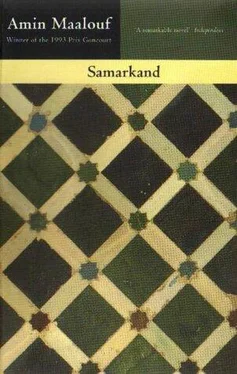‘Of you, Hassan son of Ali Sabbah, native of Qom?’
‘Did he not say: ‘A man will come from Qom. He will call upon the people to follow the straight path. Men will gather around him, like spearheads. Tempestuous winds will not be able to scatter them, nor will they tire of war or become weakened but they will rely upon God.”’
‘I do not know that quote even though I have read the certified collections of tradition.’
‘You have read the collections which you want. The Shiites have other collections.’
‘And they speak of you?’
‘Soon you will have no doubt about it.’
The man with the bulging eyes went back to his life of wandering. A tireless missionary, he criss-crossed the Muslim East — Balkh, Merv, Kashgar and Samarkand — always preaching, arguing, converting and organizing. He never left a town or a village until he had designated a representative whom he left surrounded by a circle of followers, Shiites who were tired of waiting and submitting, Persian or Arab Sunnites exasperated by Turkish domination, young men in a state of agitation, or believers in search of rigour. Hassan’s army was growing every day. Its members were called ‘Batinites’, the people of the secret, and they were treated as heretics or atheists. The ulema pronounced anathema after anathema upon them: ‘Woe betide him who joins them, woe betide him who eats at their table, woe betide him who joins them through marriage, it is as legitimate to spill their blood as to water one’s garden.’
The pitch mounted and violence did not remain long restricted to words. In the town of Savah, the preacher of a mosque denounced certain people, who, at the time of prayer, were assembling away from the other Muslims. He invited the police to deal ruthlessly with them and eighteen heretics were arrested. A few days later, the man who had denounced them was found stabbed. Nizam al-Mulk ordered the punishment to set an example: an Ismaili carpenter was accused of murder. He was tortured and crucified. Then his body was dragged through the alleys of the bazaar.
A chronicler considered that: ‘That preacher was the Ismailis’ first victim and that carpenter was their first martyr.’ He added that their first great victory was won near the city of Kain, south of Nishapur. A caravan was arriving from Kirman, consisting of more than six hundred merchants and pilgrims as well as an important cargo of antimony. A half-day from Kain, masked and armed men barred their way. The senior man of the caravan thought that they were bandits and wanted to negotiate a ransom as he was used to doing. That, however, was not what they were after. The travellers were led toward a fortified village where they were held for several days, preached to and invited to convert. Some accepted and others were released but most of them were ultimately massacred.
However, the kidnapping of a caravan was soon going to seem a very minor affair in the huge, but underhand, test of strength which was building up. Killings and counter-killings followed each other. No town, province or route was spared and the peace of the Seljuk empire started to crumble.
That was when the memorable crisis in Samarkand broke out. A chronicler attested categorically that ‘the qadi Abu Taher was at the basis of the events’. However, things were not quite so simple.
It is true that one November afternoon Khayyam’s former protector arrived unexpectedly in Isfahan with wives and luggage, reeling off curses and oaths. Once through the gate of Tirah, he had taken himself to his friend, who lodged him, happy at last to have an occasion to show him his gratitude. Customary expressions of emotion were quickly disposed of. Abu Taher, on the edge of tears, asked:
‘I must speak to Nizam al-Mulk as soon as possible.’
Khayyam had never seen the qadi in such a state. He tried to reassure him:
‘We are going to see the Vizir tonight. Is it so serious?’
‘I have had to flee Samarkand.’
He could not go on. His voice was stifled and his tears flowed. He had aged since their last meeting. His skin was withered, his beard was white and only his bushy eyebrows retained their black hue. Omar uttered some words of consolation. The qadi pulled himself together, straightened his turban and then declared:
‘Do you remember the man who was nicknamed “Scar-Face?”’
‘How could I forget that he debated my own death in front of my eyes?’
‘You remember how he lost his temper at the slightest suspicion of a smell of heresy? Well, three years ago he joined the Ismailis and today he is proclaiming their errors with the same zeal with which he used to defend the True Faith. Hundreds and thousands of citizens are following him. He is master of the street and imposes his law on the merchants in the bazaar. On several occasions I have been to see the Khan. You knew Nasr Khan and his sudden outbursts of anger which subsided just as quickly, his fits of violence or prodigality, may God save his soul. I mention his name in every prayer. Today power is in the hands of his nephew, Ahmed, a smooth-chinned young man who is irresolute and unpredictable. I never know how to approach him. On many occasions I have complained to him about the machinations of the heretics. I have explained to him the dangers of the situation but he was distracted and bored and only half listened to me. Seeing that he had not taken any decision to act, I gathered the commanders of the militia as well as several officials whose loyalty I had acquired and requested them to place the Ismailis’ meetings under surveillance. Three trusty men took it in turn to follow Scar-Face, my aim being to present to the Khan a detailed report in order to open his eyes to their activities, until my men informed me that the chief of the heretics had arrived in Samarkand.’
‘Hassan Sabbah?’
‘In person. My men had positioned themselves at both ends of Abdack Street, in the district of Ghatfar, where an Ismaili meeting was being held. When Sabbah came out, disguised as a Sufi, they jumped him, placed a sack over his head and brought him to me.
‘Immediately I led him to the palace to announce news of his capture to the sovereign. Then, for the first time, he appeared interested and asked to see the man. Except that when Sabbah was brought before him, he ordered his cords to be untied and for them to be left alone together. In vain I tried to warn him against this dangerous heretic, recalling the misdeeds of which he was guilty, but to no avail. He wanted, he claimed, to convince the man to return to the straight path. Their conversation went on and on. From time to time one of his courtiers would half-open the door, but the two men were still talking. At first dawn they were both seen suddenly prostrating themselves in prayer, murmuring the same words. The counsellors jostled with each other to try and observe them.’
After taking a mouthful of orgeat syrup, Abu Taher uttered a formula of gratitude before carrying on:
‘Going by the evidence, it was certain that the master of Samarkand, the sovereign of Transoxania and heir to the dynasty of the Black Khans had gone over to the heresy. Naturally he avoided proclaiming this fact and continued to affect attachment to the True Faith, but nothing was the same any more. The Prince’s counsellors were replaced by Ismailis. The chiefs of the militia, who had effected Sabbah’s capture, died brutally one after another. My own guard was replaced by Scar-Face’s men. What choice did I have left except to leave with the first pilgrim caravan and to come and make the situation known to those who carry the sword of Islam, Nizam al-Mulk and Malikshah.’
That evening Khayyam took Abu Taher to the Vizir. He introduced him and then left them to talk in private. As Nizam listened reverently to his visitor his face took on a worried expression. When the qadi stopped speaking, he spoke up:
Читать дальше












